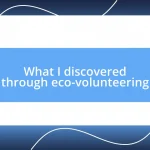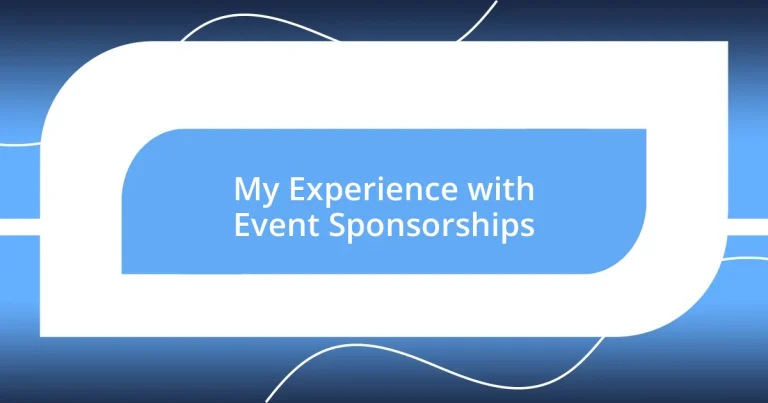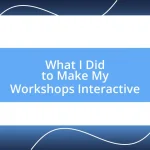Key takeaways:
- Effective sponsorship creates memorable experiences through genuine audience engagement, moving beyond mere brand visibility.
- Building strong relationships with event organizers fosters collaboration and enhances the overall impact of sponsorships.
- Measuring sponsorship success involves both quantitative metrics and qualitative feedback, emphasizing the importance of lasting brand connections.
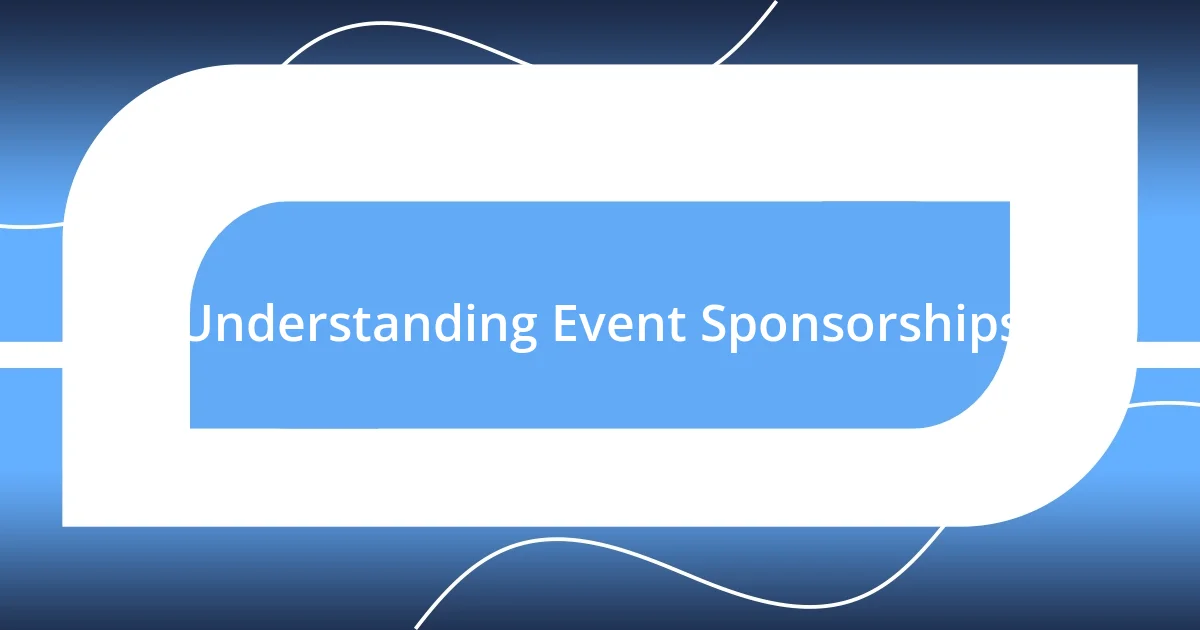
Understanding Event Sponsorships
Event sponsorship is a powerful tool that builds connections between brands and audiences. I still remember my first experience attending a sponsored event. The sponsor’s presence wasn’t just visible; it felt integral to the whole experience, creating a buzz that drew attendees in. How often have you left an event feeling more connected to a brand simply because they made the experience memorable?
From my perspective, effective event sponsorship goes beyond just putting a logo on a banner. The best sponsors genuinely engage with the audience, providing value rather than just promoting their products. For instance, I once participated in a conference where sponsors not only showcased their services but also hosted interactive workshops. It was refreshing to see how they turned traditional sponsorship on its head, sparking conversations and forging connections instead of simply pushing their agenda. Have you ever found yourself drawn to a brand because of a unique experience they created at an event?
When I think about the emotional impact of sponsorships, I often reflect on how they can influence the overall atmosphere of an event. I recall an art festival where a local company sponsored not just a booth but a creative space for artists to collaborate. The excitement was palpable; attendees were not only drawn to the art but also to the engaging activities. It made me appreciate how sponsorship can foster a community, transforming a simple gathering into a memorable experience for everyone involved. Have you ever attended an event where sponsorship made all the difference?
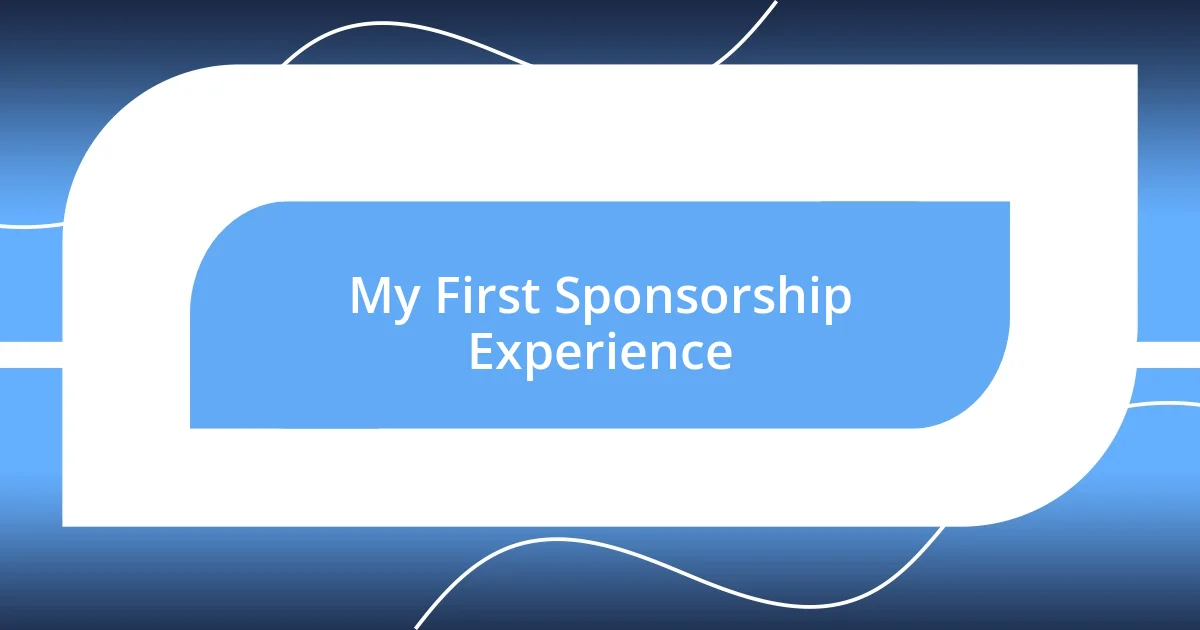
My First Sponsorship Experience
My first sponsorship experience was a game-changer for me. It was a small but vibrant local music festival, and I remember feeling the thrill in the air as the company sponsoring the event transformed an ordinary gathering into something extraordinary. Their interactive booth was a hit, drawing crowds with engaging activities like live demonstrations and giveaways. It was this hands-on approach that made me realize how much more impactful sponsorship could be when done right.
- The sponsor created an inviting atmosphere that encouraged interaction.
- They handed out fun merchandise that really resonated with festival-goers.
- The live demonstrations showcased their product in a relatable and fascinating way, making it hard not to connect emotionally with the brand.
This experience stirred something inside me, showing me the powerful role sponsors can play in enhancing an event’s overall vibe. It also ignited my passion for exploring how such partnerships can create genuine connections, not just transactions.
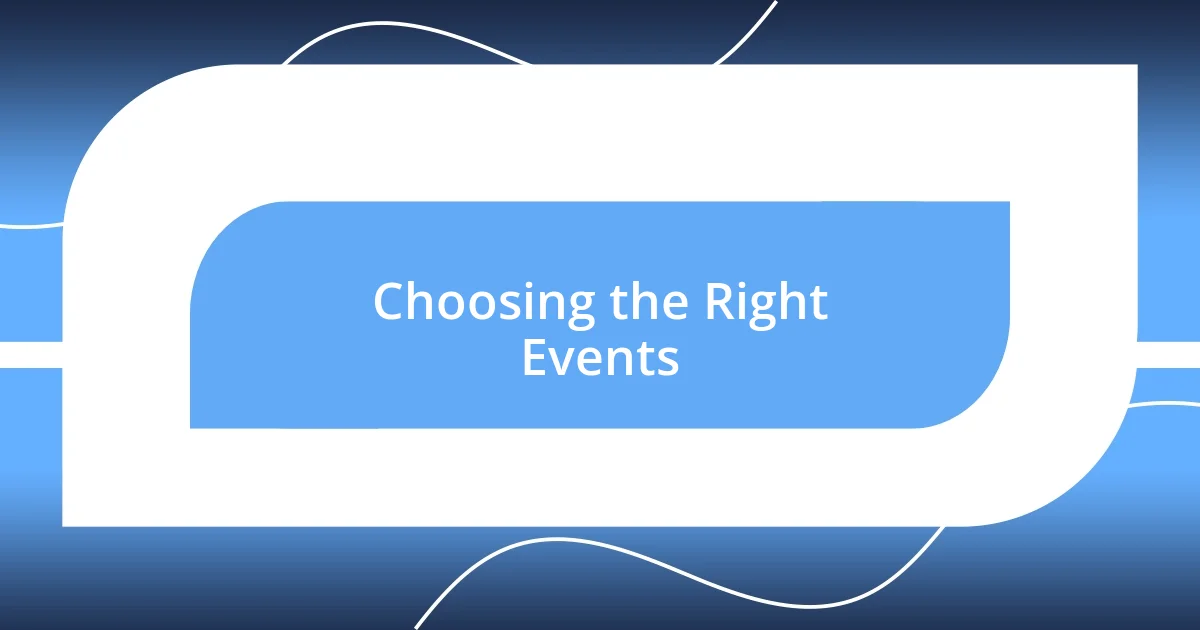
Choosing the Right Events
Choosing the right events for sponsorship can feel challenging yet exhilarating. I’ve learned that aligning your brand with an event that resonates with your target audience is crucial. For instance, I once partnered with a tech expo that attracted innovators and enthusiasts. The fit was right; we not only reached our target market but also created meaningful conversations around our products.
As I reflect on different sponsorship experiences, I realize the importance of considering an event’s overall vibe and audience engagement. At a community fair, I witnessed firsthand how a brand tailored its approach, sponsoring an interactive booth that engaged families through games and activities. This made attendees not just aware of the brand but also excited to interact, which is a lesson I’ve taken to heart in my sponsorship strategies.
It’s vital to analyze the event’s reach as well. I recall a food festival with a mix of food lovers and local vendors. The sponsorship opportunities there were vibrant and far-reaching. By sponsoring a cooking demonstration, we captured the attention of attendees who were passionate about culinary arts, which led to lasting connections. My experience has shown me that selecting the right events involves understanding the audience’s interests and the potential for memorable interactions.
| Factors to Consider | My Experience |
|---|---|
| Event Alignment | Tech expo aligned with our innovation goals |
| Audience Engagement | Interactive booth at a community fair attracted families |
| Event Reach | Sponsoring cooking demos at food festivals created valuable connections |
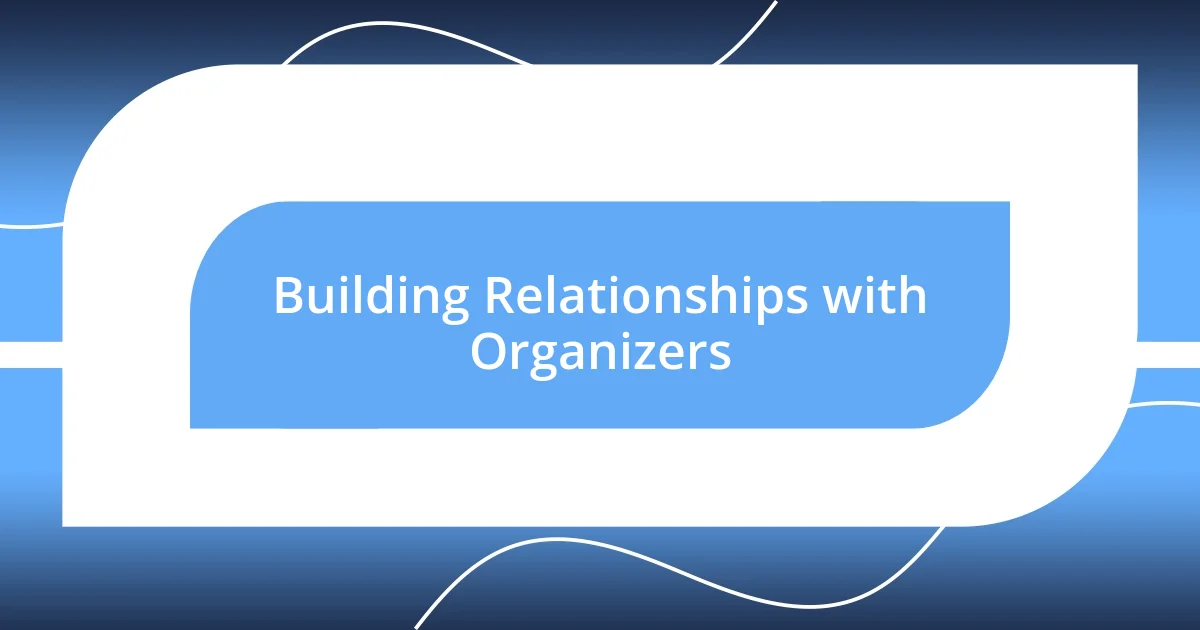
Building Relationships with Organizers
Building relationships with event organizers is key to a successful sponsorship experience. I learned this firsthand during a charity gala where I worked closely with the event planner. We strategized together on how our brand could enhance the evening, leading to a genuine partnership that ultimately brought in more donations. How often do you get the chance to work directly with someone whose vision aligns with yours? That collaboration sparked creativity and ensured we both benefited from the event.
In another instance, I attended a networking dinner for sponsors and organizers. I made it a point to engage deeply with the organizers, asking them about their challenges and visions for future events. This openness led to insightful conversations where we discovered shared values and goals. It made me realize that these relationships thrive on mutual understanding and respect. Have you ever found that one conversation can open the door to countless opportunities? It’s all about fostering trust and providing value.
Establishing these connections goes beyond emails and contracts; it’s about creating a sense of community. I remember an outdoor festival where I joined the organizers in brainstorming sessions. It felt incredibly fulfilling to contribute ideas and see them come to life at the event. The camaraderie that formed made everything smoother, from logistics to last-minute changes. That experience taught me the power of being an active participant rather than just a sponsor. Wouldn’t it be amazing if every sponsorship felt like an empowering partnership?
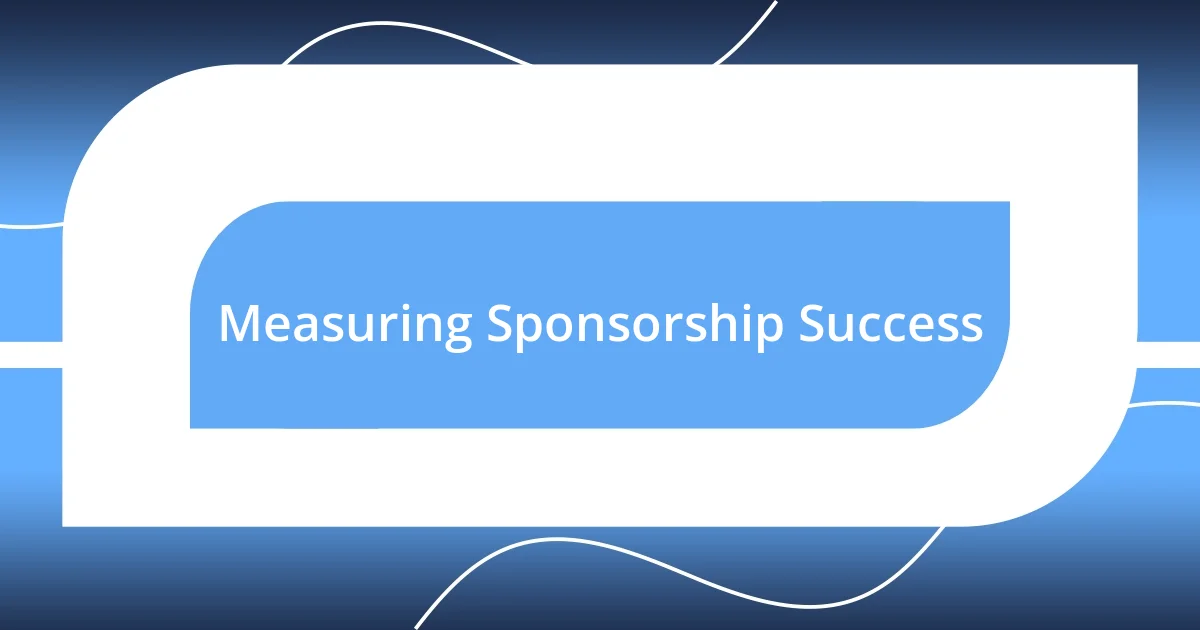
Measuring Sponsorship Success
Measuring success in sponsorship can be as nuanced as defining success itself. I remember a local art festival where we sponsored a gallery space. We tracked engagement through guestbook entries and social media tags. The joy of seeing our brand mentioned alongside artists we admired really highlighted the relational impact of our involvement. It made me think: are we measuring success by numbers, or by connections?
Another aspect I’ve found essential is the feedback loop. During a health and wellness expo, we distributed surveys to attendees. The heartfelt responses we received were eye-opening; people shared how our sponsorship motivated them to try new health solutions. It’s a reminder that quantifiable metrics, like foot traffic and social media impressions, must be complemented by qualitative insights from our audience. Have you ever noticed how a simple piece of feedback can shift your perspective on an entire initiative?
Lastly, ongoing brand awareness plays a quintessential role in measuring sponsorship success. At one particularly memorable music festival, I spotted attendees wearing merchandise featuring our brand long after the event. Seeing that level of engagement reinforced my belief in the sponsorship’s lasting impact. It’s moments like these that lead me to ask: are we only interested in the immediate results, or do we also want our legacy to linger? Each experience I’ve had taught me that success isn’t just about the event itself but the relationship that develops over time.
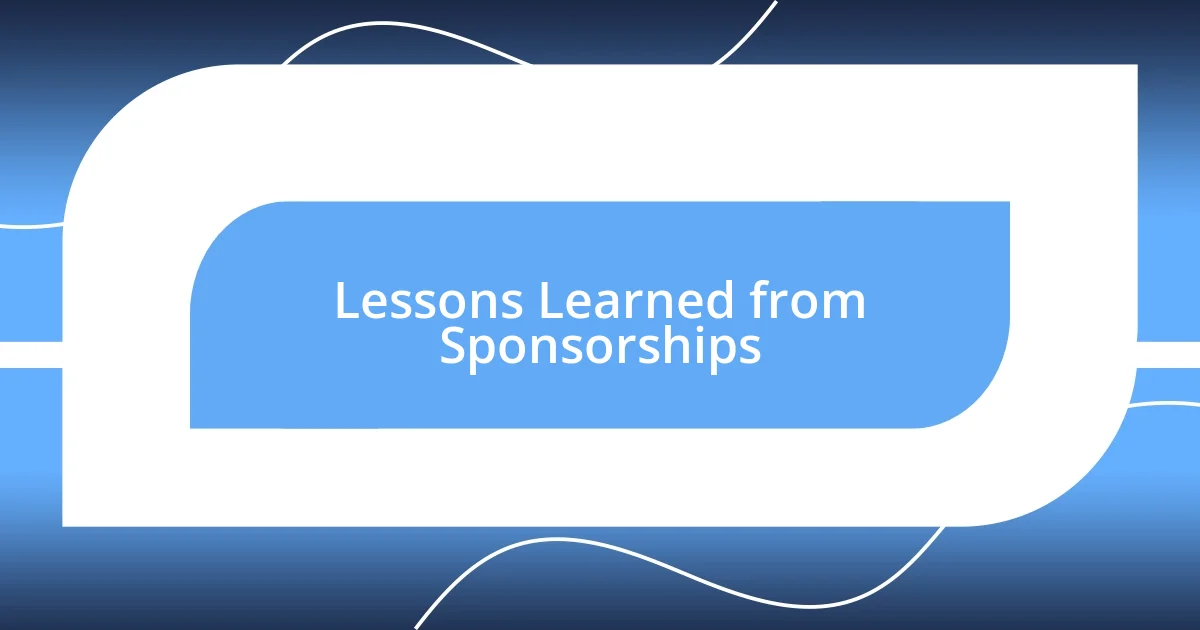
Lessons Learned from Sponsorships
One major lesson I’ve learned is the importance of aligning your brand with the right event. I recall a tech conference where we became a sponsor, but the audience just didn’t resonate with our mission. While our brand was visible, the connection felt forced. It made me reflect: can a sponsorship truly thrive if there’s no authentic link between the event and what you represent? Finding events that mirror your brand’s values is crucial for genuine engagement.
Another crucial takeaway is flexibility. During a culinary festival, our initial plan to showcase a cooking demo had to change last minute due to weather. Instead, we pivoted and set up an interactive tasting booth indoors. Despite the unexpected shift, I was amazed at how it allowed us to interact deeply with attendees. This experience made me wonder—how often do we cling to our original ideas when adaptability could lead to even greater success?
Lastly, I’ve learned that storytelling is powerful. At a community fair, we decided to share our brand’s story through local testimonials, allowing attendees to see the real impact of our work. Seeing people connect emotionally with our journey was breathtaking. It led me to ask: does your sponsorship tell a story that resonates? Authentic stories can create an emotional bond, making your sponsorship far more memorable in the hearts of your audience.
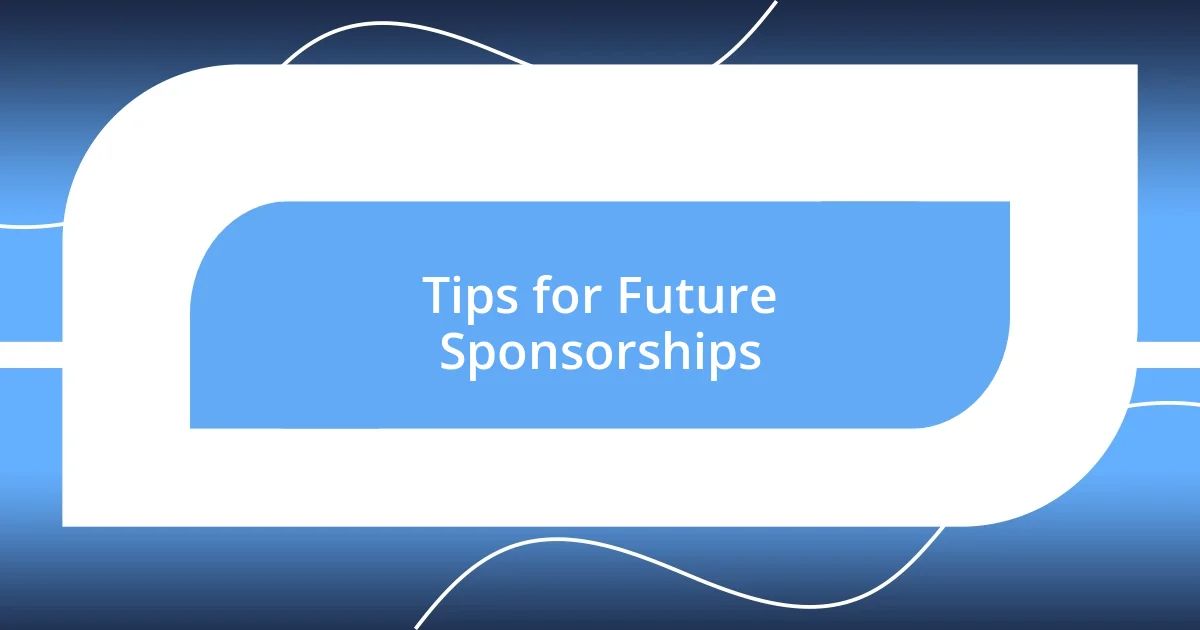
Tips for Future Sponsorships
When considering future sponsorships, it’s essential to do thorough research on the event’s audience. I remember attending a special charity gala where I realized, too late, that our target demographic didn’t align with the attendees. It felt disheartening, watching our investment take center stage while missing out on meaningful connections. How often do we dive in without checking if we’re really swimming in the right pool?
Another tip I found invaluable is to cultivate relationships with event organizers from the start. At a recent trade show, I took the time to meet with the organizers and understand their vision. This open dialogue led not just to a sponsorship but to collaboration opportunities, enriching our experience and creating a sense of teamwork. I can’t help but ask: How can we unlock even more potential by truly engaging with the people behind the event?
Lastly, consider incorporating interactive elements that encourage direct engagement. At a family fun day, we set up a booth where kids could participate in a craft activity related to our brand. The laughter and creativity I witnessed made it clear: people connect with experiences, not just logos. Have you noticed how engagement fosters a sense of belonging? This approach can elevate your sponsorship from being a simple transaction to a memorable experience, leaving a lasting impact on the community.






